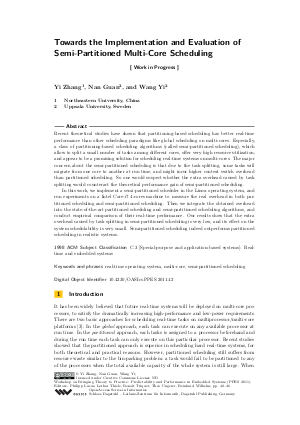Towards the Implementation and Evaluation of Semi-Partitioned Multi-Core Scheduling
Authors Yi Zhang, Nan Guan, Wang Yi
-
Part of:
Volume:
Bringing Theory to Practice: Predictability and Performance in Embedded Systems (PPES 2011)
Part of: Series: Open Access Series in Informatics (OASIcs) - License:
 Creative Commons Attribution-NoDerivs 3.0 Unported license
Creative Commons Attribution-NoDerivs 3.0 Unported license
- Publication Date: 2011-03-21
File

PDF
OASIcs.PPES.2011.42.pdf
- Filesize: 329 kB
- 5 pages
Document Identifiers
Subject Classification
Keywords
- real-time operating system
- multi-core
- semi-partitioned scheduling
Metrics
- Access Statistics
-
Total Accesses (updated on a weekly basis)
0PDF Downloads0Metadata Views
Abstract
Recent theoretical studies have shown that partitioning-based scheduling has better real-time performance than other scheduling paradigms like global scheduling on multi-cores. Especially, a class of partitioning-based scheduling algorithms (called semi-partitioned scheduling), which allow to split a small number of tasks among different cores, offer very high resource utilization, and appear to be a promising solution for scheduling real-time systems on multi-cores. The major concern about the semi-partitioned scheduling is that due to the task splitting, some tasks will migrate from one core to another at run time, and might incur higher context switch overhead than partitioned scheduling. So one would suspect whether the extra overhead caused by task splitting would counteract the theoretical performance gain of semi-partitioned scheduling. In this work, we implement a semi-partitioned scheduler in the Linux operating system, and run experiments on a Intel Core-i7 4-cores machine to measure the real overhead in both partitioned scheduling and semi-partitioned scheduling. Then we integrate the obtained overhead into the state-of-the-art partitioned scheduling and semi-partitioned scheduling algorithms, and conduct empirical comparison of their real-time performance. Our results show that the extra overhead caused by task splitting in semi-partitioned scheduling is very low, and its effect on the system schedulability is very small. Semi-partitioned scheduling indeed outperforms partitioned scheduling in realistic systems.
Cite As Get BibTex
Yi Zhang, Nan Guan, and Wang Yi. Towards the Implementation and Evaluation of Semi-Partitioned Multi-Core Scheduling. In Bringing Theory to Practice: Predictability and Performance in Embedded Systems. Open Access Series in Informatics (OASIcs), Volume 18, pp. 42-46, Schloss Dagstuhl – Leibniz-Zentrum für Informatik (2011)
https://doi.org/10.4230/OASIcs.PPES.2011.42
BibTex
@InProceedings{zhang_et_al:OASIcs.PPES.2011.42,
author = {Zhang, Yi and Guan, Nan and Yi, Wang},
title = {{Towards the Implementation and Evaluation of Semi-Partitioned Multi-Core Scheduling}},
booktitle = {Bringing Theory to Practice: Predictability and Performance in Embedded Systems},
pages = {42--46},
series = {Open Access Series in Informatics (OASIcs)},
ISBN = {978-3-939897-28-6},
ISSN = {2190-6807},
year = {2011},
volume = {18},
editor = {Lucas, Philipp and Wilhelm, Reinhard},
publisher = {Schloss Dagstuhl -- Leibniz-Zentrum f{\"u}r Informatik},
address = {Dagstuhl, Germany},
URL = {https://drops.dagstuhl.de/entities/document/10.4230/OASIcs.PPES.2011.42},
URN = {urn:nbn:de:0030-drops-30804},
doi = {10.4230/OASIcs.PPES.2011.42},
annote = {Keywords: real-time operating system, multi-core, semi-partitioned scheduling}
}
